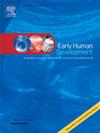高危新生儿重症监护室毕业生第一年的发展轨迹。
IF 2.2
3区 医学
Q2 OBSTETRICS & GYNECOLOGY
引用次数: 0
摘要
目的:研究早期医学因素是否能预测高危新生儿重症监护病房(NICU)毕业生出生后第一年发育水平和轨迹的变异性。方法:纳入符合高危婴儿随访计划标准的婴儿(n = 53)。简单线性模型预测12个月的发育能力,线性混合模型预测6至12个月的轨迹,基于新生儿重症监护室停留时间和出生体重。结果:新生儿重症监护病房的住院时间更清楚地预测了12个月的发育水平,而出生体重更好地解释了轨迹的可变性。沟通和日常生活技能会因早期医疗因素而变化,而社交技能则不会。运动技能随住院时间长短而变化,但与出生体重无关。结论:结果支持对新生儿重症监护病房毕业生进行密切发育监测的必要性,特别是那些住院时间较长和出生体重较低的毕业生。发展支持需求不仅应该基于当前的延迟,还应该基于婴儿学习新技能的速度。本文章由计算机程序翻译,如有差异,请以英文原文为准。
Developmental trajectories in high-risk NICU graduates during the first year of life
Objective
We examined whether early medical factors predicted variability in developmental level and trajectories in high-risk neonatal intensive care unit (NICU) graduates during the first year of life.
Method
Infants (n = 53) who met criteria for the High-Risk Infant Follow-up Program were enrolled. Simple linear models predicted 12-month developmental abilities and linear mixed models predicted 6- to 12-month trajectories based on length of NICU stay and birthweight.
Results
Length of NICU stay was more clearly predictive of 12-month developmental level, while birthweight better explained variability in trajectories. Communication and daily living skills varied based on early medical factors, whereas social skills did not. Motor skills varied by length of stay but not birthweight.
Conclusion
Results support the need for close developmental monitoring of NICU graduates, particularly those with lengthier stays and lower birthweight. Developmental support needs should be based not just on current delays, but on the rate at which infants learn new skills.
求助全文
通过发布文献求助,成功后即可免费获取论文全文。
去求助
来源期刊

Early human development
医学-妇产科学
CiteScore
4.40
自引率
4.00%
发文量
100
审稿时长
46 days
期刊介绍:
Established as an authoritative, highly cited voice on early human development, Early Human Development provides a unique opportunity for researchers and clinicians to bridge the communication gap between disciplines. Creating a forum for the productive exchange of ideas concerning early human growth and development, the journal publishes original research and clinical papers with particular emphasis on the continuum between fetal life and the perinatal period; aspects of postnatal growth influenced by early events; and the safeguarding of the quality of human survival.
The first comprehensive and interdisciplinary journal in this area of growing importance, Early Human Development offers pertinent contributions to the following subject areas:
Fetology; perinatology; pediatrics; growth and development; obstetrics; reproduction and fertility; epidemiology; behavioural sciences; nutrition and metabolism; teratology; neurology; brain biology; developmental psychology and screening.
 求助内容:
求助内容: 应助结果提醒方式:
应助结果提醒方式:


